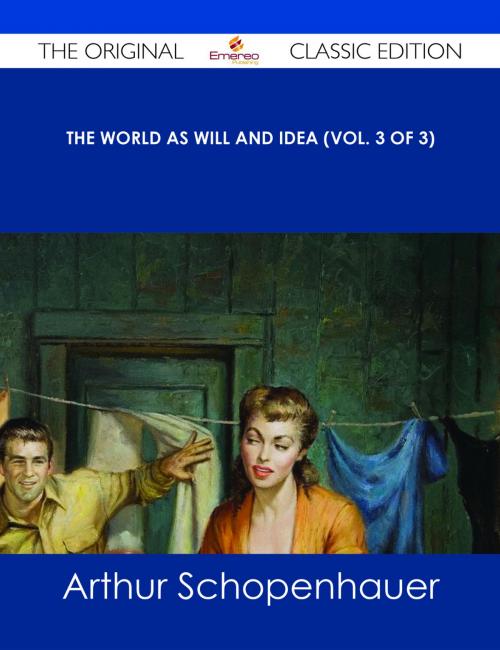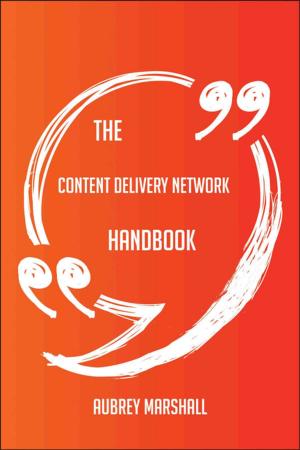The World as Will and Idea (Vol. 3 of 3) - The Original Classic Edition
Nonfiction, Reference & Language, Reference, Fiction & Literature| Author: | Arthur Schopenhauer | ISBN: | 9781486444571 |
| Publisher: | Emereo Publishing | Publication: | March 18, 2013 |
| Imprint: | Emereo Publishing | Language: | English |
| Author: | Arthur Schopenhauer |
| ISBN: | 9781486444571 |
| Publisher: | Emereo Publishing |
| Publication: | March 18, 2013 |
| Imprint: | Emereo Publishing |
| Language: | English |
This is a new and freshly published edition of this culturally important work by Arthur Schopenhauer, which is now, at last, again available to you.
Get the PDF and EPUB NOW as well. Included in your purchase you have The World as Will and Idea (Vol. 3 of 3) in EPUB AND PDF format to read on any tablet, eReader, desktop, laptop or smartphone simultaneous - Get it NOW.
Enjoy this classic work today. These selected paragraphs distill the contents and give you a quick look inside The World as Will and Idea (Vol. 3 of 3):
Look inside the book:
If, therefore, nature presents to us every living thing as appearing out of nothing, and, after an ephemeral existence, returning again for ever to nothing, and if it seems to take pleasure in the unceasing production of new beings, in order that it may be able unceasingly to destroy, and, on the other hand, is unable to bring anything permanent to light; if accordingly we are forced to recognise matter as that which alone is permanent, which never came into being and never passes away, but brings forth all things from its womb, whence its name appears to be derived from mater rerum, and along with it, as the father of things, form, which, just as fleeting as matter is permanent, changes really every moment, and can only maintain itself so long as it clings as a parasite to matter (now to one part of it, now to pg 027 another), but when once it entirely loses hold, disappears, as is shown by the palæotheria and the ichthyosaurians, we must indeed recognise this as the direct and genuine utterance of nature, but on account of the origin of the intellect explained above, and the nature of it which results from this origin, we cannot ascribe to this utterance an unconditional truth, but rather only an entirely conditional truth, which Kant has appropriately indicated as such by calling it the phenomenon in opposition to the thing in itself. ...Now in proportion as, in the ascending series of animals, the nervous and muscular systems separate ever more distinctly from each other, till in the vertebrate animals, and most completely in man, the former divides into an organic and a cerebral nervous system, and of these the latter again develops into the excessively complicated apparatus of the cerebrum and cerebellum, spinal marrow, cerebral and spinal nerves, sensory and motor nerve fascicles, of which only pg 030 the cerebrum, together with the sensory nerves depending upon it, and the posterior spinal nerve fascicles are intended for the apprehension of the motive from the external world, while all the other parts are intended for the transmission of the motive to the muscles in which the will manifests itself directly; in the same proportion does the motive separate ever more distinctly in consciousness from the act of will which it calls forth, thus the idea from the will; and thereby the objectivity of consciousness constantly increases, for the ideas exhibit themselves ever more distinctly and purely in it.
About Arthur Schopenhauer, the Author:
If the reader has also received the benefit of the Vedas, the access to which by means of the Upanishads is in my eyes the greatest privilege which this still young century (1818) may claim before all previous centuries, if then the reader, I say, has received his initiation in primeval Indian wisdom, and received it with an open heart, he will be prepared in the very best way for hearing what I have to tell him. It will not sound to him strange, as to many others, much less disagreeable; for I might, if it did not sound conceited, contend that every one of the detached statements which constitute the Upanishads, may be deduced as a necessary result from the fundamental thoughts which I have to enunc
This is a new and freshly published edition of this culturally important work by Arthur Schopenhauer, which is now, at last, again available to you.
Get the PDF and EPUB NOW as well. Included in your purchase you have The World as Will and Idea (Vol. 3 of 3) in EPUB AND PDF format to read on any tablet, eReader, desktop, laptop or smartphone simultaneous - Get it NOW.
Enjoy this classic work today. These selected paragraphs distill the contents and give you a quick look inside The World as Will and Idea (Vol. 3 of 3):
Look inside the book:
If, therefore, nature presents to us every living thing as appearing out of nothing, and, after an ephemeral existence, returning again for ever to nothing, and if it seems to take pleasure in the unceasing production of new beings, in order that it may be able unceasingly to destroy, and, on the other hand, is unable to bring anything permanent to light; if accordingly we are forced to recognise matter as that which alone is permanent, which never came into being and never passes away, but brings forth all things from its womb, whence its name appears to be derived from mater rerum, and along with it, as the father of things, form, which, just as fleeting as matter is permanent, changes really every moment, and can only maintain itself so long as it clings as a parasite to matter (now to one part of it, now to pg 027 another), but when once it entirely loses hold, disappears, as is shown by the palæotheria and the ichthyosaurians, we must indeed recognise this as the direct and genuine utterance of nature, but on account of the origin of the intellect explained above, and the nature of it which results from this origin, we cannot ascribe to this utterance an unconditional truth, but rather only an entirely conditional truth, which Kant has appropriately indicated as such by calling it the phenomenon in opposition to the thing in itself. ...Now in proportion as, in the ascending series of animals, the nervous and muscular systems separate ever more distinctly from each other, till in the vertebrate animals, and most completely in man, the former divides into an organic and a cerebral nervous system, and of these the latter again develops into the excessively complicated apparatus of the cerebrum and cerebellum, spinal marrow, cerebral and spinal nerves, sensory and motor nerve fascicles, of which only pg 030 the cerebrum, together with the sensory nerves depending upon it, and the posterior spinal nerve fascicles are intended for the apprehension of the motive from the external world, while all the other parts are intended for the transmission of the motive to the muscles in which the will manifests itself directly; in the same proportion does the motive separate ever more distinctly in consciousness from the act of will which it calls forth, thus the idea from the will; and thereby the objectivity of consciousness constantly increases, for the ideas exhibit themselves ever more distinctly and purely in it.
About Arthur Schopenhauer, the Author:
If the reader has also received the benefit of the Vedas, the access to which by means of the Upanishads is in my eyes the greatest privilege which this still young century (1818) may claim before all previous centuries, if then the reader, I say, has received his initiation in primeval Indian wisdom, and received it with an open heart, he will be prepared in the very best way for hearing what I have to tell him. It will not sound to him strange, as to many others, much less disagreeable; for I might, if it did not sound conceited, contend that every one of the detached statements which constitute the Upanishads, may be deduced as a necessary result from the fundamental thoughts which I have to enunc















